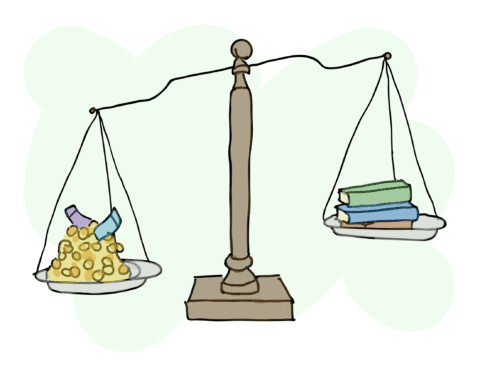Working as a student is not always easy and sometimes it can hinder our performance at school. Some students even quit their studies to be able to maximize their earnings in their job. So, the question is, how can we manage our work and study at the same time without wearing ourselves out?
Indulging oneself in work that is as physically and emotionally stressful as our studies is not an easy task. According to Statistics Canada, 63 per cent of students rely on their jobs to fund their education. This includes a grueling amount of tuition fees and expenses such as books and school materials.
The current statistics also show that Saskatchewan is second only to Ontario in terms of weighted average of undergraduate tuition fees for Canadian full-time students, sitting at $6,885 and $7,868 respectively.
These amounts are expected to increase as more facilities and equipment are installed in each provinces’ respective universities, leaving students no choice but to  either limit their expenditures or seek part-time jobs.
either limit their expenditures or seek part-time jobs.
However, our bodies can only manage to perform the tasks at hand to their maximum capability and some students overexert themselves, leading to a drastic decline in their performance both at school and work.
To avoid being bogged down by your work and studies, first you must learn to prioritize what’s important and avoid distractions. A continuous stream of assignments, deadlines and a stressful environment at work — these can quickly wear us out if we don’t choose which one to tackle first.
At some point, you need to give up some of your hours at work to accommodate your studies. For example, working primarily on weekends or during the mid-semester break can be a good strategy.
Additionally, our workload can even get worse with the interference of distractions such as scanning your Facebook, playing mobile games or wasting your time watching movies while there are still tons of studying and assignments left unfinished.
Another key strategy is to organize and manage your schedule for your studies and work to avoid conflict between the two. Work on your schedule and inform your manager if you need a certain length of days for which you want to allocate for study.
Having a to-do list and frequently checking it is a great way to avoid cramming during exams. Time management is a crucial skill to be able to avoid excessive stress and heavy workloads that will arise from work and studies.
Always keep a backup plan just in case of emergency and study ahead of time to prevent cases of being in state of panic. Procrastination is the biggest threat for students and should be minimized by keeping yourself engaged in your lectures, doing practice quizzes or exams and re-reading the chapters that you find difficult.
Maximize your time for studying by bringing with you a small booklet that contains important points from your lecture that you can study during your break.
Lastly and most important of all, you should love what you’re doing in the first place, give yourself the time to relax and schedule an activity or sport that will boost your emotional and physical well-being.
Out of necessity, more and more students become attached to their work instead of focusing on their studies that will decide their future. The pressure of doing two tasks that are both necessary is surely a challenge.
The initiative should come from the willingness of the student to allocate their time to their studies and avoid trying to cover all the tasks all at once. Proper time management, choosing which should come first and avoiding leaving tasks to the last minute are the keys to maintain balance between studies and work.
—
Ian Joemar T. Guion
Graphic: Lesia Karalash / Graphics Editor
Leave a Reply